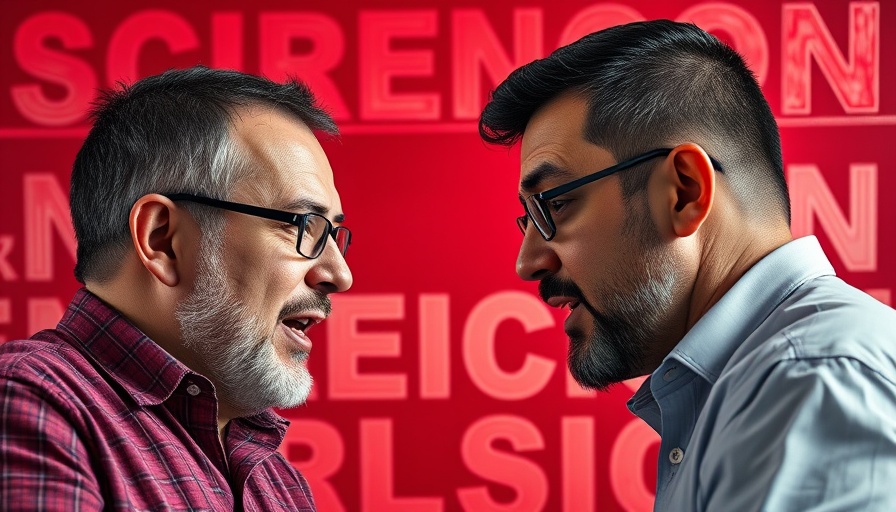
The Intersection of Science and Faith: Unraveling Common Myths
In the recent dialogue between Alex O'Connor and John Lennox, featured in the video Alex O'Connor & John Lennox on Science and Religion, viewers are invited to contemplate the often contentious relationship between science and religion. This discussion sheds light on an essential question that many believers and skeptics grapple with: Do science and faith truly exist in opposition to one another?
In Alex O'Connor & John Lennox on Science and Religion, the discussion dives into the relationship between faith and science, exploring key insights that sparked deeper analysis on our end.
A Historical Lens on Science and Religion
The notion that science and religion are irreconcilable foes has roots in history that often overlook more nuanced realities. Historical figures like Galileo, who faced opposition from the Church, serve as prime examples of this narrative. However, as acknowledged by both Lennox and O'Connor, many of the pioneering scientists responsible for foundational concepts in modern science—such as Galileo, Kepler, and Newton—were devout believers in God. Their faith motivated their desire to understand the cosmos, suggesting that rather than living in conflict, science flourishes in the light of religious belief.
The Mathematics of Creation: Evidence of a Designed Universe
One of the key points raised by Lennox is the idea that the universe operates on rigorous mathematical laws. He explains how this possibility suggests an intelligent creator. The very structure of the universe—its measurable laws—hint at a design that transcends mere chance. This perspective reclaims mathematics and science as a means of revealing divine intention rather than negating it.
Language as a Guiding Principle
Additionally, Lennox emphasizes a profound insight: the universe is fundamentally a word-based phenomenon. The Bible’s assertion that God ‘spoke’ the world into existence reflects a deeper reality—that language, information, and communication lie at the heart of both creation and comprehension. Thus, the increasing complexity revealed within biology—including the intricate design of DNA—supports rather than undermines faith. It calls into question the adequacy of naturalistic explanations alone without attributing such complexity to an intelligent designer.
The Role of Information in Understanding Evolution
When addressing questions about evolution, Lennox points out the distinction between theoretical evolution and the origin of life itself. While Darwinian evolution explains how species adapt over time, it does not address how life began. The complexity inherent in DNA challenges the idea that life arose from random processes alone, suggesting a guiding intelligence behind it all. Lennox's argument compels us to consider that scientific discoveries do not negate the existence of a divine creator; instead, they illuminate the intricacies of His creation.
The Challenge Posed by Atheism
As discussions around science and religion continue to evolve, believers often face the challenge of new atheistic critiques claiming that advances in science undermine the relevance of God. Yet, Lennox asserts an important truth: the absence of belief does not equate to the absence of evidence. Just as evidence of design can be seen in nature, so too can the yearning for purpose and meaning in human existence point toward a higher reality—a creator.
Equipping Ourselves for the Journey of Faith
For believers grappling with doubts or external criticisms, it is crucial to ground oneself in a comprehensive understanding of both faith and science. Engaging with works by knowledgeable authors like Lennox or Hugh Ross helps provide clarity and affirmation that faith and reason are not disparate, but rather partners in the search for truth.
Conclusion: A Call to Deepen Our Understanding
The dialogue between O'Connor and Lennox serves as a catalyst for reflection: Can we embrace science wholeheartedly while holding tightly to our faith in God? As we delve deeper into these discussions, let us remember that every scientific discovery has the potential to enrich our understanding of God’s magnificent creation.
If you are curious about how science and faith interact in your life, I encourage you to engage with the complexities of this discussion. Explore resources, attend lectures, and converse with individuals from diverse backgrounds. In doing so, you may find a strengthened faith that appreciates the wonders of both science and religion.
 Add Row
Add Row  Add
Add 








 Add Row
Add Row  Add
Add 

Write A Comment